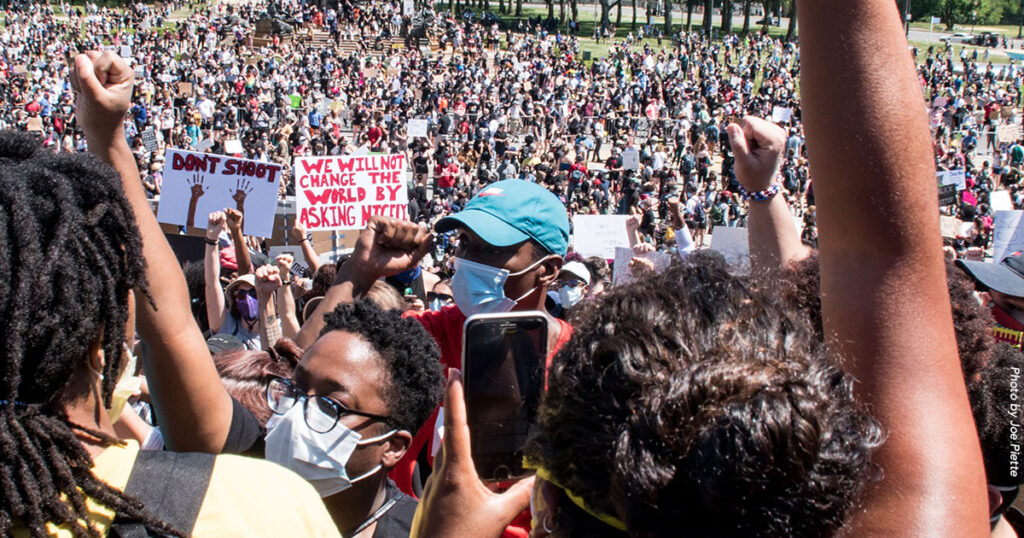
Dr. John H. Jackson
President & CEO, Schott Foundation for Public Education

In 1853, Unitarian minister Theodore Parker wrote a sermon calling for the abolition of slavery titled, “Of Justice and the Conscience,” that contained a line that would go on to be figuratively quoted by ministers, rabbis, presidents, social justice leaders and ultimately, during a turbulent time in our country, flow from the pen of Dr. Martin Luther King in 1958: The arc of the moral universe is long, but it bends toward justice.
At America’s core is a nation birthed from colonies to cities with a vision of increased opportunity, democracy and love for all mankind — but also a nation that distorted that vision by using the instruments of violence and oppression over humanity. That oppression metastasized into inequities and racism that spread through every organ of America’s system, including healthcare, education, employment, and policing, and into communities across the nation.
America’s mercurial journey on the moral arc should tell us about the length and rigidity of the arc and that bending that arc towards justice doesn’t occur in lukewarm climates nor because of natural winds. Like steel, which bends best under heat, justice requires intentional moments of confrontation, protest and critical assessments.
In 2018, the Schott Foundation launched the Loving Cities Index to provide a community-informed assessment tool to determine the degree to which city systems were actually addressing their institutional inequities by providing the care, capacity, commitment and stability needed for children and families to thrive regardless of race or ethnicity. Recognizing that systemic racism is institutionalized lovelessness, the Loving Cities Index highlighted the degree to which local leaders were eliminating the policies and practices which led to racial disparities in access to the critical supports (health, transportation, financial, etc.) that too many cities had covered with Band-Aid approaches. Our 2018 assessment of 10 cities revealed that while several of the cities were beginning to use a cross-sector approach to address their support disparities, none of the ten cities were offering over 55% of the supports needed for all children in the community to thrive. Simply stated, America’s cities cannot help children reach their full potential while only giving them half of the support.
Several months ago, the COVID-19 pandemic ripped off the Band-Aid to reveal the systemwide inequities in most communities. Today, these communities remain in crisis mode, attempting to connect the dots and fill the holes caused by the persistent health, education, food, housing, mental health and transportation disparities, to name a few. Even the cities that have prepared a path to recover from the COVID-19 virus, have yet to develop a framework or path to address the true sicknesses in their systems — unemployment and non-livable wages, pervasive learning and wealth gaps, rampant disparities and unfettered systemic racism. COVID-19 made clear that inequities impacting any part of a community weaken the entire community.
Before state and local public officials can experience transformative changes in the heart of their cities, they must commit to concretizing transformative changes by creating loving systems for all. With the release of this 2020 Loving Cities Index, once again Schott engages a new group of communities in the work of assessing and addressing the supports needed in their systems to extend the care, capacity, commitment and stability to all of their children and families — creating the type of loving systems that makes it clear that their lives matter.
Assessing and creating these systems should have a heightened level of importance, as individuals of all hues and backgrounds across the country have taken to the streets to reaffirm Black Lives Matter and protest the police murders of George Floyd and Breonna Taylor, to name just a few. As protesters hit their streets in peaceful protest and unity, they seek to decouple America’s vision of opportunity and democracy from the tools of violence and oppression.
On America’s moral arc is the brutality and genocide waged against Native Americans, the slave trade, Jim Crow laws, the 16th Street Baptist Church bombing killing four Black girls, massive deportations separating children and families, the murders of nine church members at Mother Emanuel AME in Charleston, SC. But also bending that are Harriett Tubman and those who maintained an underground railroad network, abolitionist writers and poets, social justice organizations, those who marched on Washington to secure civil rights and voting rights legislation, Sanctuary Cities, Black Lives Matter, and today hundreds of thousands of peaceful protesters who are committed to lending a shoulder to bend America’s moral arc towards justice.
The Old Testament of the Bible gives an account of a man named Joshua who right before taking God’s people across the Jordan River, reminds them that “you have never been here before.” Joshua issues this proclamation fully aware that these people had already crossed many challenging seas and rivers in their journey. Yet as they sat on the bank of the Jordan River, they needed to know that though it looked familiar their God was seeking to do a new thing once they got to the other side.
While the unrest and protest and even the format of this Loving Cities Index may look familiar, collectively we have never been here before. And when we move beyond this moment and cross this proverbial river, history will judge all of us by whether the growing awareness of racism, violence and oppression translates into commitment to alter our communities’ and our nation’s course, to achieve systemic, lasting change.
The Schott Foundation remains committed to walking towards new opportunities and being a critical bridge to create the types of loving systems that ensure all children and families can thrive. As cities discuss defunding police budgets, the Loving Cities Index provides city and community leaders an assessment of where to reallocate those resources to add the critically needed supports to make the community a vibrant, safe and more loving place to live. Schott issues this 2020 Index as a community and philanthropic partner lending a shoulder and joining history’s army of justice fighters who used love for humanity to lean in and bend America’s moral arc toward justice.